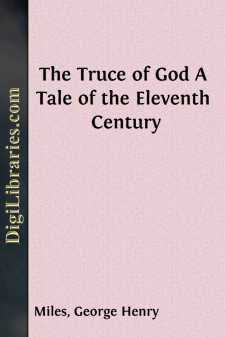Categories
- Antiques & Collectibles 13
- Architecture 36
- Art 48
- Bibles 22
- Biography & Autobiography 813
- Body, Mind & Spirit 142
- Business & Economics 28
- Children's Books 16
- Children's Fiction 13
- Computers 4
- Cooking 94
- Crafts & Hobbies 4
- Drama 346
- Education 46
- Family & Relationships 57
- Fiction 11829
- Games 19
- Gardening 17
- Health & Fitness 34
- History 1377
- House & Home 1
- Humor 147
- Juvenile Fiction 1873
- Juvenile Nonfiction 202
- Language Arts & Disciplines 88
- Law 16
- Literary Collections 686
- Literary Criticism 179
- Mathematics 13
- Medical 41
- Music 40
- Nature 179
- Non-Classifiable 1768
- Performing Arts 7
- Periodicals 1453
- Philosophy 64
- Photography 2
- Poetry 896
- Political Science 203
- Psychology 42
- Reference 154
- Religion 513
- Science 126
- Self-Help 84
- Social Science 81
- Sports & Recreation 34
- Study Aids 3
- Technology & Engineering 59
- Transportation 23
- Travel 463
- True Crime 29
The Truce of God A Tale of the Eleventh Century
Categories:
Description:
Excerpt
INTRODUCTION
"The Truce of God" by our American novelist and dramatist, George Henry Miles, is not only a romantic and interesting story, it recalls one of the most striking achievements of the Middle Ages.
After the tide of barbarian invasion, Goths and Vandals, Heruli, Burgundians and Franks had swept away the edifice of Roman civilization, had it not been for the regenerating influence of Christianity, another empire as cruel would have risen on the ruins of Rome. No other power would then have ruled but the sword. The sword was king, and received the worship of thousands. Now and then a ruler appeared like Theodoric, Charlemagne, the Lombard Luitprand, who used the sword on the whole for just and beneficent ends. And because these warrior kings, even in the midst of their conquests, brought some of the blessings of peace to their subject peoples, these peoples welcomed their sway. Peace was, then as now, one of the world's needs.
Although the eighth, ninth and succeeding century were not without their brighter sides and were not those totally Dark Ages they have been represented by the enemies of the Church, nevertheless, seeds of evil passions, which in spite of her endeavors the Church had been unable completely to stifle, lingered in the hearts of those strong-limbed, strong-passioned Teutonic races which had succeeded to the tasks and responsibilities of pagan Rome. Those races did not have Rome's organizing power. By force, it is true, in a great measure, but force intelligently applied, but also by patience, by an instinct for justice and for order, Rome had welded her vast empire into a coherent whole. Rome really, and effectively ruled. She had authority, she had prestige, she was respected and feared, until the fatal day when, for her vices and tyranny, she began to be hated. That day her fate was sealed.
The Teutonic races lacked the power of organization. They were strong and comparatively free from the vices of Rome; they had a rude sense of justice. But that very sense and instinct for that one essential of ordered life drove the individual to take the execution of the law and of justice into his own hands and to claim his rights at the point of the sword. The result can be easily imagined. The sword was never for a long time thrust back into the scabbard. Incessant wars, not at the bidding of the ruler, nor sanctioned by the voice of public authority or for the public welfare, but for private ends, for revenge, for greed and booty, were waged throughout the length and breadth of Europe.
The civil government, or the empty simulacrum that went under the name, seemed powerless, for the simple reason that the strong arm of either a Charlemagne or a Charles Martel too seldom appeared to check the culprits, or because the civil government itself only added fuel to the flame, by the encouragement it gave to license and violence by its own evil example.
But society had to protect itself. Conscious of its danger, and that it was doomed to destruction, if some remedy were not found, it evolved in the tenth and the following century, not an absolutely efficacious remedy, but one which enabled it to pass in comparative safety that dangerous period and carried European civilization to the full glories of the age of Dante, St....


